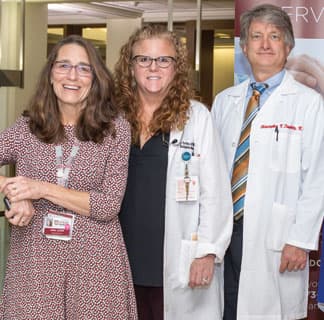Ovarian cancer survivors have shown resilience in the face of the pandemic, but are still at risk for mental health challenges

Survivors of cancer often develop resilience to cope with the challenges that come with a life-threatening disease, which may benefit them when facing challenges in other areas of life. A new study from the University of Chicago Medicine found high rates of resilience in ovarian cancer survivors during the first few months of the COVID-19 pandemic.
But as the pandemic drags on, the mental health of these patients may be at long-term risk. This study found high rates of loneliness, which the authors warn could erode resilience. Integrating more mental health services into cancer care is a possible solution, the authors suggest.
Nita K. Lee, MD, MPH, Associate Professor of Obstetrics and Gynecology, adapted the questions asked in the survey from a previous studies of ovarian cancer patients have shown higher rates of anxiety and depression (over 20% for anxiety and over 15% for depression).
Preserving quality of life during COVID-19
Javellana was encouraged that resilience was prevalent for these patients and that rates of anxiety and depression were low. However, she is concerned about whether these patients have been able to maintain their resilience since the early days of the pandemic when the survey was taken. “One of the big things I’m wondering is whether these people have lost resilience through all of this. We called people three or four months into the pandemic, so now two years down the line, were they able to adapt to it and maintain their resilience? Or has this ongoing pandemic worn them down? Who was able to maintain their resilience and who was not?”
In the study, 43% of respondents reported that they felt lonelier than they had before the beginning of the pandemic. While not surprising, this result is concerning as loneliness is associated with a variety of health issues, and could threaten resilience.
Because of their cancer status and in some cases, advanced age, many ovarian cancer patients have had difficulty seeing family members throughout the pandemic. Javellana has treated patients who are still afraid to travel, and others whose families are too worried to come to see them, even since vaccines have become available.
“A lot of them said, ‘I would rather take the risk, but the people around me don’t want to risk my health,’” she said.
While a major goal of cancer treatment is to extend the lives of patients, Javellana advocates for prioritizing quality of life as well.
“It’s not worth continuing to put you through chemotherapy if then all you can do is lay in bed and feel ill, or sit in your house when you’re not going to be able to enjoy your life and enjoy the people you love,” Javellana said. “People are more than their disease, and the reason that we treat the disease is to give people quality time. We need to remember to keep the focus on that.”
Meeting mental health needs of cancer patients
Working first as a resident and now as a fellow in gynecologic oncology, Javellana has developed greater insight into the needs of cancer patients throughout their treatment. She observes that this area of medicine is vulnerable to being overburdened, especially when it comes to mental health.
“Gynecologic oncology is very much a do-it-all specialty, doing both surgery and chemotherapy, and then following these patients longitudinally for their cancer surveillance. We want to support these patients with the high mental health burden that they carry, but when the system is stressed by something like COVID-19, mental health care often is the first thing to end up by the wayside,” she said.
UChicago Medicine offers mental health services to cancer patients through its Supportive Oncology program, including the psych-oncology program. Patients are evaluated for signs of psychological distress and connected with psychologists, psychiatrists, and social workers who support them and their families through their treatment.
The Section of Gynecologic Oncology leads community-based programs with local and national cancer advocacy groups to provide additional support options for patients and caregivers. Since the pandemic, many resources have included online and virtual resources, which have helped many stay connected but have limits for older patients or those without technology support. Javellana said more should be done to make these services available to patients who need them.
“We have wonderful mental health care providers at UChicago Medicine, but there just aren’t enough of them,” she said. “A big issue in the field is not being able to connect patients with mental health care professionals who could help them.
“This study provides more evidence that we need more integrated mental health care providers in cancer care at large, especially for types of cancer that have such a high mortality rate like ovarian cancer, but also lung cancer and others,” Javellana said. “These patients need more support to help them cope with these difficult diagnoses.”
Additional authors of the study, “Resilience in the Face of Pandemic: The Impact of COVID-19 on the Psychologic Morbidity and Health-Related Quality of Life Among Women With Ovarian Cancer,” include Fay J. Hlubocky, MA, PhD, Sahana Somasegar, MD, Mia Sorkin, MSS, PA-C, Katherine C. Kurnit, MD, MPH, Ina Jani, MD, Elizabeth Stock, MD, Kathryn Mills, MD, Ernst Lengyel, MD, PhD, and Nita K. Lee, MD, MPH, of the University of Chicago.
Lily Burton is a Nita Karnik Lee, MD, specializes in the diagnosis and treatment of gynecologic cancers. Her focus is on providing comprehensive and compassionate care to women diagnosed with ovarian, uterine, cervical, vulvar or vaginal cancers. The supportive oncology program offers a range of helpful services for cancer patients and their families, including mental health care, nutrition counseling, social work support and more.
Nita Karnik Lee, MD, MPH

Helping You Cope With Cancer
